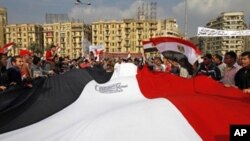Clashes between Egyptian security forces and political protesters in the country's southwest have killed three protesters and wounded several others, the latest in protest-related violence that the United Nations says has killed more than 300 people since January 25.
Several protesters in the New Valley region suffered gunshot wounds during the clashes on Tuesday and Wednesday. Meanwhile, in Cairo, thousands of people remain in Tahrir Square, pressing demands for the ouster of long-serving President Hosni Mubarak.
What Vice President said
Protesters camping in Tahrir Square have turned it into a sprawling tent city, complete with medical points, charging stations for mobile phones, sound stages and even a radio station. They have also set up an area to honor demonstrators killed in protest-related violence, filled with pictures of the dead and other memorabilia.
Egypt's Vice President Omar Suleiman says the government will not tolerate prolonged anti-government protests in Cairo's main square, where protester numbers swelled in the hundreds of thousands Tuesday.
Egypt's state-run news agency MENA quoted Suleiman as saying that a crisis triggered by 16 days of anti-Mubarak protests in Tahrir Square must end "as soon as possible."
MENA says Suleiman told a group of newspaper editors that the presence of anti-Mubarak activists and satellite television stations in the square was making Egyptian citizens "hesitant to go to work" and disrupting daily life. He accused the satellite television stations of "insulting" Egypt, without naming them.
Suleiman also is quoted as saying the government does not want to deal with Egyptian society using "police tools" and prefers to use dialogue to try to address the protesters' demands.
Slideshow of photos from Tahrir Square
Other activists protested for a second day outside Egypt's parliament, several streets away from the square. Some had slept on the ground overnight, hoping to block access to the building. They demanded the resignation of lawmakers elected late last year in a vote they say was rigged in favor of the ruling party.
Mubarak's latest move
Mubarak has responded to the protests by declaring he will not to run for a sixth term in a September election and offering other political concessions, but the protesters have rejected those pledges as superficial.
The president met with Russian envoy Alexander Sultanov Wednesday in Cairo, where they discussed the Egyptian government's efforts to meet the demands of the Egyptian people.
The vice president said Mubarak has issued decrees establishing separate committees to draft constitutional reforms and monitor their implementation. The reforms are aimed at relaxing eligibility rules for the presidency and imposing term limits - key demands of Egypt's opposition.
He said Mubarak also formed a third committee to investigate deadly fighting last week between his supporters and anti-government activists in Tahrir Square.
The Egyptian vice president held unprecedented talks with several opposition groups on Sunday, but representatives of the Cairo street protesters did not participate.
Some information for this report was provided by AFP, AP and Reuters.




